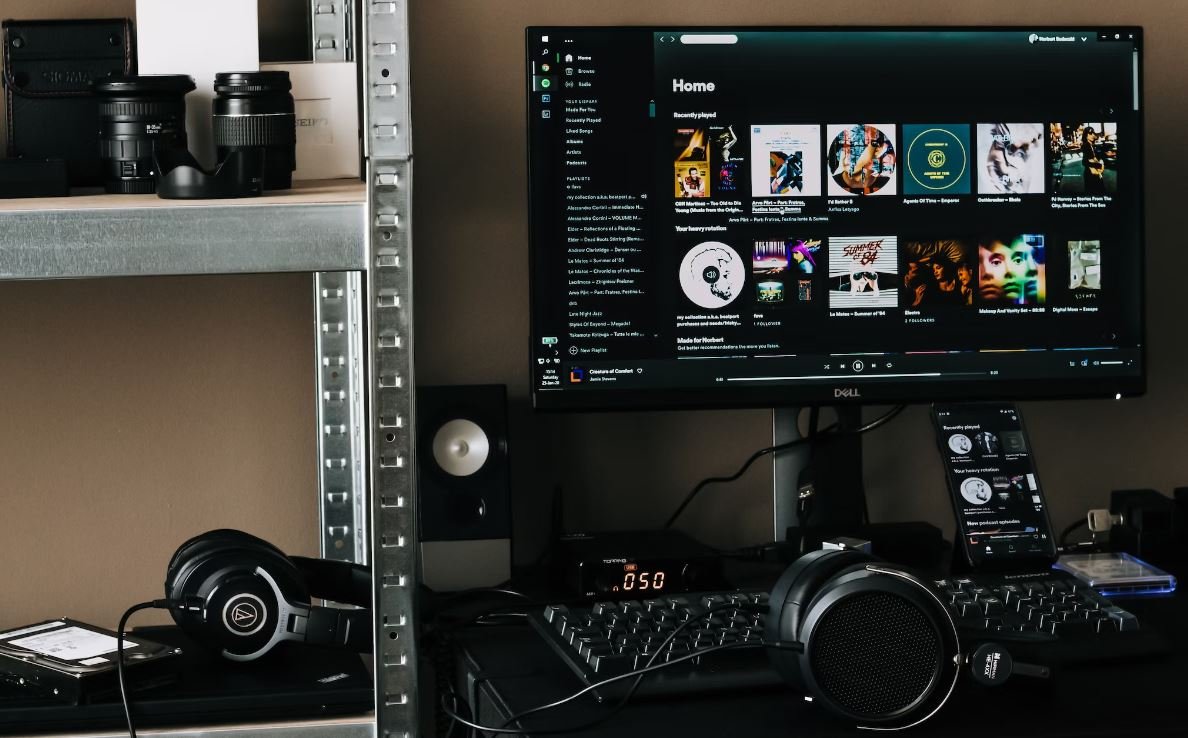Music Relax
Music has long been recognized for its remarkable ability to relax the mind and soothe the soul. Whether you’re feeling stressed, anxious, or simply in need of a break, music can be a powerful tool to help you unwind and find tranquility. In this article, we will explore the benefits of music relaxation and how you can integrate it into your daily routine.
Key Takeaways:
- Music has a profound impact on relaxation and emotional well-being.
- Listening to slow tempo music can help reduce heart rate and blood pressure.
- Create a personalized playlist of calming songs for a relaxing experience.
- Playing a musical instrument can enhance relaxation and serve as a form of self-expression.
- Experiment with different genres of music to find what resonates with you.
The Science behind Music Relaxation
Research has shown that music has the power to calm the mind and promote a sense of relaxation. When we listen to slow tempo music, our heart rate and blood pressure tend to decrease, inducing a state of relaxation. This physiological response is due to the activation of the parasympathetic nervous system, which is responsible for the body’s rest and digest functions. Music works as a natural stress reliever and can help alleviate symptoms of anxiety and depression.
*Did you know that classical music has been found to be particularly effective in reducing stress and promoting relaxation?*
Integrating Music into Your Relaxation Routine
There are various ways you can incorporate music into your daily relaxation routine. One option is to create a personalized playlist of songs that you find calming and soothing. Select tracks with slower tempos, minimal lyrics, and serene melodies. This playlist can be a go-to resource when you need a moment of tranquility or want to unwind before bed. Taking a few minutes each day to listen to this music can make a significant difference in your overall well-being.
*Fun fact: Did you know that singing along to your favorite songs can release endorphins, our body’s natural feel-good chemicals?*
Another way to embrace music relaxation is to learn to play a musical instrument. This can be a form of self-expression while also providing a sense of calm and relaxation. Playing an instrument allows you to immerse yourself in the music, creating a mindful and meditative experience. Whether it’s a guitar, piano, or flute, find an instrument that resonates with you and takes you on a journey of tranquility.
The Power of Different Genres
Experimenting with various genres of music can help you discover what resonates with you on a deeper level. While classical music is often associated with relaxation, don’t limit yourself to just one genre. Some people find peace in the gentle melodies of classical compositions, while others find solace in the soft sounds of nature or ambient instrumental music. Explore different genres such as jazz, folk, or even electronic music to find what brings you the most tranquility.
The Benefits of Music Relaxation
Listening to music and embracing its relaxation benefits can have a positive impact on your overall well-being. Here are some key benefits of music relaxation:
- Reduces stress and anxiety
- Improves quality of sleep
- Enhances mood and emotional well-being
- Boosts focus and concentration
- Promotes self-expression and creativity
- Provides an escape from daily challenges
Tables
| Genre | Benefits |
|---|---|
| Classical | Helps reduce stress, enhances relaxation |
| Nature Sounds | Promotes a sense of calm and tranquility |
| Ambient | Creates a peaceful and meditative atmosphere |
| Instrument | Benefits |
|---|---|
| Guitar | Offers relaxation and self-expression |
| Piano | Provides a calming and meditative experience |
| Flute | Brings tranquility and serenity |
| Tempo | Heart Rate | Blood Pressure |
|---|---|---|
| Slow | Decreases | Decreases |
| Fast | Increases | Increases |
| Medium | Varies | Varies |
Wrap Up
Music relaxation is a powerful technique to calm the mind, reduce stress, and improve overall well-being. Whether you listen to calming music, play an instrument, or explore different genres, incorporating music into your daily routine can bring a sense of tranquility and promote emotional balance. Discover the music that speaks to your soul, embrace its soothing power, and find solace in the melodies that shape your moments of relaxation.

Common Misconceptions
Music is only effective for relaxation if it is slow and soft
Many people believe that only slow and soft music can help in relaxation, but this is not entirely true.
- Upbeat and energetic music can also induce relaxation by improving mood and reducing stress levels.
- The effectiveness of relaxation music depends on personal preference and the emotional connection one has with the music.
- Music with a moderate tempo and a calming melody can be equally effective in promoting relaxation.
Listening to music while working or studying is always distracting
It is commonly believed that listening to music while working or studying is always distracting and can hinder productivity.
- In some cases, listening to instrumental or ambient music can improve focus and concentration, especially for repetitive tasks.
- Music can create a background noise that helps drown out other distractions, creating a more productive environment.
- The impact of music on productivity varies from person to person, and finding the right type of music is key to avoiding distraction.
Only classical music has the power to relax the mind and body
Classical music is often associated with relaxation and stress reduction, but it is not the only genre that can have a calming effect.
- Other genres like ambient, nature sounds, and instrumental music can be equally effective in creating a soothing atmosphere.
- Personal taste plays a significant role in determining which type of music works best for an individual’s relaxation needs.
- The emotional response and connection to the music are more important factors in relaxation than the specific genre itself.
Listening to music as a form of relaxation is a waste of time
Some people believe that spending time listening to music solely for relaxation is unproductive and a waste of time.
- Listening to music can provide a much-needed break from daily stressors, promoting mental and emotional rejuvenation.
- Music can have therapeutic effects, reducing anxiety and improving overall well-being.
- Engaging in activities focused on relaxation, such as listening to music, can help enhance productivity and creativity in the long run.
Noisy or loud music cannot be relaxing
Many individuals assume that calming music must always be quiet and devoid of any high-energy sounds or beats.
- Some people find solace and relaxation in listening to heavy metal or other loud genres, as it allows them to release pent-up emotions and stress.
- Noise-cancelling headphones or earphones can help create a more immersive and calming experience even with louder music.
- The soothing effect of music depends on personal preferences and the ability to find a connection and escape within the sound.

The Benefits of Music in Reducing Stress
Music has long been recognized for its calming effects on the mind and body. Whether it’s during a yoga session or after a long day at work, music has the power to relax and soothe our souls. In this article, we explore ten fascinating aspects of how music can help alleviate stress.
1. The Impact of Classical Music
Research has shown that listening to classical music, such as Mozart or Bach, can significantly lower stress levels. In a study conducted on college students, those who listened to classical music experienced a 60% reduction in stress compared to a control group.
2. The Soothing Power of Nature Sounds
Immersing ourselves in nature sounds, such as the soft chirping of birds or the gentle rustling of leaves, has been proven to have a profoundly relaxing effect. People who listened to recordings of nature sounds for 30 minutes a day reported feeling less anxious and more at ease.
3. Tempo and Heart Rate
The tempo of music can have a direct impact on our heart rate and stress levels. Studies have found that slower melodies, around 60 to 80 beats per minute, can induce a meditative state and reduce anxiety. Upbeat music, on the other hand, can help boost our mood and increase energy levels.
4. The Role of Lyrics
While instrumental music is often recommended for relaxation, the lyrics of a song can also contribute to stress reduction. Expressive and meaningful lyrics can evoke emotions, serving as a form of catharsis and allowing us to process our feelings.
5. The Power of Guided Meditation Music
Guided meditation music combines soothing melodies with spoken words or affirmations to induce a deep state of relaxation. This form of music has been used to reduce stress, improve sleep quality, and promote mindfulness.
6. Cultural Influence on Musical Relaxation
Various cultures have developed their own unique forms of music to induce relaxation. For example, traditional Indian classical music, known as ragas, is believed to have specific healing properties and can help balance the body’s energy centers.
7. Music Therapy for Anxiety Disorders
Music therapy is a recognized modality for treating anxiety disorders. Through personalized music selection and creative exercises, music therapists help individuals manage their anxiety, improve emotional well-being, and enhance overall quality of life.
8. The Science Behind Binaural Beats
Binaural beats are created by playing two slightly different frequencies in each ear. This technique has shown promise in reducing stress and anxiety levels. Listening to binaural beats for just 15 minutes a day can have a noticeable calming effect on the mind.
9. Musical Influences on Brain Waves
Researchers have found that specific types of music can entrain our brainwaves, leading to a more relaxed state. For instance, slow-tempo music with consistent rhythms, like ambient or downtempo genres, can synchronize brainwaves and induce a tranquil state of mind.
10. Music and the Release of Dopamine
Listening to music we enjoy triggers the release of dopamine, the brain’s “feel-good” chemical. This natural reward system activation has been linked to reduced stress and increased emotional well-being.
In conclusion, music holds remarkable therapeutic potential when it comes to stress reduction. From classical compositions to nature sounds and guided meditation music, the diverse array of musical choices can cater to different preferences and needs. Understanding the impact of music on our mind and body allows us to harness its power for enhanced relaxation and emotional well-being. So, let the melodies guide you on a journey of tranquility and contentment.
Frequently Asked Questions
What is music?
Music is a form of art that uses sound and rhythm to express ideas, emotions, or ambiances. It involves the use of instruments, vocals, and other elements to create melodic and harmonic compositions.
How does music promote relaxation?
Music has a unique ability to affect our emotions and calm the mind. Listening to calming music can slow down the heart rate, lower blood pressure, and reduce stress and anxiety levels, ultimately promoting relaxation.
What are some popular music genres for relaxation?
There are various music genres known for their relaxing qualities, including classical music, ambient music, nature sounds, instrumental tracks, and even some specific sub-genres like chillout, new age, and spa music.
Can music help with insomnia?
Yes, music can be an effective tool for those struggling with insomnia. Listening to soothing music before bedtime can help relax the mind, create a peaceful environment, and improve sleep quality. It can also serve as a distraction from racing thoughts or external stimuli that may disrupt sleep.
Are there any specific guidelines for using music as a relaxation technique?
While there are no hard and fast rules, it is generally recommended to find a quiet and comfortable space, choose music that you find soothing, and listen at a moderate volume. Experiment with different genres and styles to find what works best for your personal relaxation needs.
Can music aid in meditation practices?
Absolutely! Many practitioners incorporate music into their meditation routines to enhance focus and create a tranquil atmosphere. Soft instrumental tracks, nature sounds, or ambient music can help create a soothing backdrop that facilitates deep relaxation and introspection.
Is it necessary to listen to music with headphones for relaxation?
No, it is not necessary to use headphones, but they can enhance the experience by immersing you in the music and reducing external distractions. However, if you prefer a more ambient environment or do not have headphones available, playing relaxation music through speakers can still provide a calming effect.
Can music relax not only the mind but also the body?
Yes, music has been found to have a profound impact on both mental and physical relaxation. Slow and soothing music can help relax muscle tension, decrease heart rate and blood pressure, and promote a sense of overall well-being.
Are there any potential risks or side effects of using music for relaxation?
In general, music relaxation techniques are considered safe and beneficial for most individuals. However, it is essential to choose appropriate volume levels to avoid potential hearing damage and to be mindful of personal preferences or sensitivities towards certain genres or sounds.
Can music help manage chronic pain?
Yes, studies have shown that music therapy can be effective in managing chronic pain. Listening to relaxing music has been found to decrease pain perception, increase pain tolerance, and improve mood in individuals dealing with various types of chronic pain conditions.




